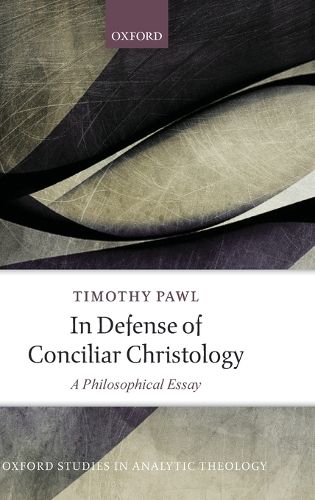Readings Newsletter
Become a Readings Member to make your shopping experience even easier.
Sign in or sign up for free!
You’re not far away from qualifying for FREE standard shipping within Australia
You’ve qualified for FREE standard shipping within Australia
The cart is loading…






This work presents a historically informed, systematic exposition of the Christology of the first seven Ecumenical Councils of undivided Christendom, from the First Council of Nicaea in 325 AD to the Second Council of Nicaea in 787 AD. Assuming the truth of Conciliar Christology for the sake of argument, Timothy Pawl considers whether there are good philosophical arguments that show a contradiction or incoherence in that doctrine. He presents the definitions of important terms in the debate and a helpful metaphysics for understanding the incarnation. In Defense of Conciliar Christology discusses three types of philosophical objections to Conciliar Christology. Firstly, it highlights the fundamental philosophical problem facing Christologyahow can one thing be both God and man, when anything deserving to be called God must have certain attributes, and yet it seems that nothing that can aptly be called man can have those same attributes? It then considers the argument that if the Second Person of the Holy Trinity were immutable or atemporal, as Conciliar Christology requires, then that Person could not become anything, and thus could not become man. Finally, Pawl addresses the objection that if there is a single Christ then there is a single nature or will in Christ. However, if that conditional is true, then Conciliar Christology is false, since it affirms the antecedent of the conditional to be true, but denies the truth of the consequent. Pawl defends Conciliar Christology against these charges, arguing that all three philosophical objections fail to show Conciliar Christology inconsistent or incoherent.
$9.00 standard shipping within Australia
FREE standard shipping within Australia for orders over $100.00
Express & International shipping calculated at checkout
This work presents a historically informed, systematic exposition of the Christology of the first seven Ecumenical Councils of undivided Christendom, from the First Council of Nicaea in 325 AD to the Second Council of Nicaea in 787 AD. Assuming the truth of Conciliar Christology for the sake of argument, Timothy Pawl considers whether there are good philosophical arguments that show a contradiction or incoherence in that doctrine. He presents the definitions of important terms in the debate and a helpful metaphysics for understanding the incarnation. In Defense of Conciliar Christology discusses three types of philosophical objections to Conciliar Christology. Firstly, it highlights the fundamental philosophical problem facing Christologyahow can one thing be both God and man, when anything deserving to be called God must have certain attributes, and yet it seems that nothing that can aptly be called man can have those same attributes? It then considers the argument that if the Second Person of the Holy Trinity were immutable or atemporal, as Conciliar Christology requires, then that Person could not become anything, and thus could not become man. Finally, Pawl addresses the objection that if there is a single Christ then there is a single nature or will in Christ. However, if that conditional is true, then Conciliar Christology is false, since it affirms the antecedent of the conditional to be true, but denies the truth of the consequent. Pawl defends Conciliar Christology against these charges, arguing that all three philosophical objections fail to show Conciliar Christology inconsistent or incoherent.